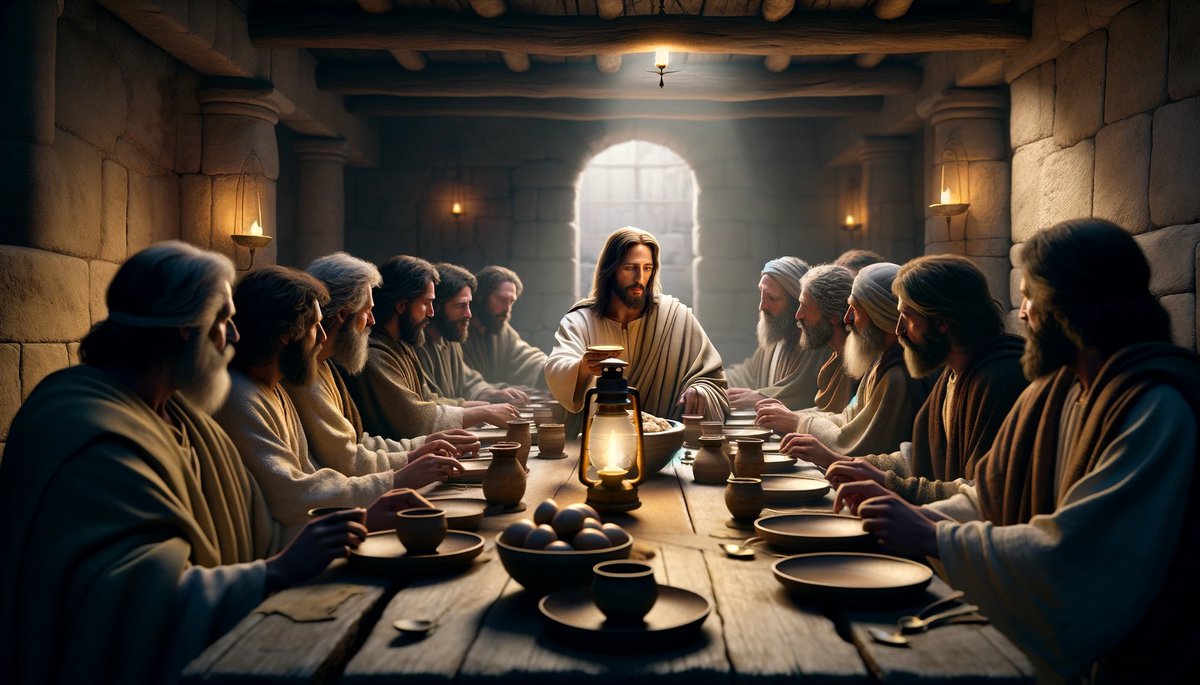Home>Theology and Spirituality>Where Do I Find Communion In The Bible


Theology and Spirituality
Where Do I Find Communion In The Bible
Published: February 19, 2024
Ericka Andersen, an editor at Christian.net, expertly merges digital strategy with content creation, focusing on faith and societal issues. Her communication skills enhance the platform's engaging narratives, fostering meaningful dialogue on belief's impact on society.
Discover the significance of communion in the Bible and its relevance to theology and spirituality. Explore the biblical references and teachings on communion.
(Many of the links in this article redirect to a specific reviewed product. Your purchase of these products through affiliate links helps to generate commission for Christian.net, at no extra cost. Learn more)
Table of Contents
Introduction
Communion, also known as the Lord's Supper or the Eucharist, holds profound significance in the Christian faith. It is a sacred practice that symbolizes the spiritual nourishment and unity of believers with Christ and one another. The roots of communion can be traced back to the Last Supper, a pivotal event in the life of Jesus Christ, which is documented in the New Testament of the Bible. This timeless ritual has been a cornerstone of Christian worship for centuries, serving as a powerful reminder of Christ's sacrifice and the covenant between God and humanity.
As we delve into the exploration of communion in the Bible, we will journey through the Old and New Testaments to uncover the rich tapestry of spiritual meaning woven into this practice. From the symbolic elements of bread and wine to the profound theological implications, communion encapsulates the essence of Christian faith and fellowship. It is a sacred act that transcends time and space, inviting believers to partake in a spiritual feast that nourishes the soul and strengthens the bonds of community.
Throughout this exploration, we will gain a deeper understanding of the historical and spiritual significance of communion, shedding light on its origins and evolution within the biblical narrative. Moreover, we will reflect on the enduring relevance of communion in contemporary Christian worship and its role in fostering a deeper connection with God and fellow believers. Join me on this enlightening journey as we uncover the timeless wisdom and spiritual depth encapsulated in the practice of communion as depicted in the pages of the Bible.
Read more: What Do I Do For Lent
Communion in the Old Testament
In exploring the concept of communion in the Old Testament, we encounter rich symbolism and foreshadowing that lay the foundation for the profound significance of this sacred practice. While the term "communion" may not be explicitly used in the Old Testament, the elements and themes that underpin this spiritual ritual are intricately woven into the fabric of ancient Hebrew traditions and practices.
One of the most notable instances that foreshadows the essence of communion is found in the narrative of the Passover. In the book of Exodus, the Israelites are instructed to commemorate the Passover as a perpetual observance, marking their deliverance from slavery in Egypt. During this sacred ritual, a lamb is sacrificed, and its blood is used to mark the doorposts of the Israelites' homes, signifying protection from the angel of death. The Passover meal, which includes unleavened bread and bitter herbs, serves as a poignant reminder of God's faithfulness and deliverance.
The sacrificial aspect of the Passover, particularly the shedding of the lamb's blood, prefigures the atoning sacrifice of Jesus Christ in the New Testament. The imagery of redemption and protection through the blood of the lamb resonates deeply with the Christian understanding of communion as a symbolic partaking of Christ's sacrificial offering for the salvation of humanity.
Furthermore, the role of priests in the Old Testament offers insights into the spiritual significance of communion. The priests served as intermediaries between the people and God, offering sacrifices and presenting offerings on behalf of the community. The act of partaking in the offerings symbolized the communal relationship with God and the acknowledgment of His provision and sustenance.
The concept of fellowship and communal meals also permeates the Old Testament, reflecting the importance of shared meals in fostering unity and spiritual nourishment. The act of sharing a meal was a symbol of hospitality, kinship, and covenantal relationships. It signified a bond of trust and mutual commitment, echoing the profound sense of unity and fellowship embodied in the practice of communion.
In essence, while the formal institution of communion as practiced in the Christian tradition is primarily rooted in the New Testament, the foundational elements and spiritual themes that define communion find resonance in the rich tapestry of the Old Testament. The sacrificial imagery, priestly mediation, and communal fellowship portrayed in the Old Testament foreshadow the profound spiritual truths encapsulated in the practice of communion, laying the groundwork for its enduring significance in the Christian faith.
This section will be followed by 'Communion in the New Testament'.
Communion in the New Testament
The New Testament provides the definitive framework for the practice of communion, offering profound insights into its spiritual significance and transformative power within the Christian faith. At the heart of the New Testament portrayal of communion lies the Last Supper, a pivotal event in the life of Jesus Christ that serves as the cornerstone of the Eucharistic tradition.
The Last Supper, as documented in the Gospels of Matthew, Mark, and Luke, and the First Epistle to the Corinthians, unfolds as a poignant and symbolic gathering where Jesus shares a final meal with his disciples before his crucifixion. During this sacred occasion, Jesus takes bread, blesses it, breaks it, and gives it to his disciples, declaring, "Take, eat; this is my body." He then takes the cup, gives thanks, and offers it to his disciples, saying, "Drink from it, all of you; for this is my blood of the covenant, which is poured out for many for the forgiveness of sins."
The profound symbolism embedded in the act of sharing bread and wine at the Last Supper encapsulates the essence of communion as a spiritual feast that unites believers with the sacrificial offering of Christ. The bread represents Christ's body, broken for humanity, while the wine symbolizes his blood, shed for the forgiveness of sins. This act of partaking in the elements signifies a profound spiritual union with Christ, embodying the essence of his redemptive sacrifice and the establishment of a new covenant between God and humanity.
The apostle Paul, in his first letter to the Corinthians, provides further theological insight into the significance of communion, emphasizing its communal and transformative nature. He exhorts believers to partake in the Lord's Supper with reverence and self-examination, recognizing the profound implications of sharing in the body and blood of Christ. Paul underscores the communal aspect of communion, highlighting its role in fostering unity and mutual care within the body of believers.
The New Testament also portrays the early Christian community engaging in the practice of breaking bread and sharing meals as a symbol of fellowship and spiritual communion. The Acts of the Apostles depicts the believers coming together to break bread, pray, and share their possessions, reflecting a deep sense of communal solidarity and spiritual nourishment.
In essence, the New Testament illuminates the profound spiritual depth and communal significance of communion, grounding it in the transformative sacrifice of Christ and the unity of believers in the body of Christ. The Last Supper and the apostolic teachings provide a compelling foundation for the enduring practice of communion in the Christian faith, inviting believers to partake in a sacred feast that nourishes the soul and fosters unity within the community of faith.
The Importance of Communion in the Bible
The significance of communion in the Bible transcends mere ritualistic observance; it embodies profound spiritual truths and communal unity that resonate throughout the Christian faith. At its core, communion serves as a tangible expression of the believer's union with Christ and fellow members of the faith community. This sacred practice holds multifaceted importance, encompassing spiritual nourishment, remembrance of Christ's sacrifice, and the embodiment of unity within the body of believers.
First and foremost, communion stands as a poignant symbol of spiritual nourishment and sustenance. The act of partaking in the bread and wine during the Eucharistic celebration represents a spiritual feast wherein believers commune with the redemptive essence of Christ's sacrifice. It serves as a reminder of Christ's enduring presence and the sustenance derived from a deep, abiding relationship with Him. The spiritual nourishment derived from communion transcends the physical elements, offering a profound sense of sustenance for the soul and a renewal of faith.
Moreover, communion holds a central role in commemorating the sacrificial offering of Jesus Christ. The act of sharing the bread, symbolizing Christ's body, and the wine, symbolizing His blood, serves as a tangible remembrance of the atoning sacrifice made on behalf of humanity. This act of remembrance not only honors the profound love and grace extended through Christ's sacrifice but also reaffirms the centrality of His redemptive work in the Christian faith. Communion thus becomes a sacred testament to the transformative power of Christ's sacrifice, inviting believers to partake in the eternal significance of His redemptive act.
Furthermore, communion embodies the essence of unity within the body of believers. As individuals partake in the Eucharistic celebration, they are invited into a communal experience that transcends individuality and fosters a sense of interconnectedness within the faith community. The shared participation in communion underscores the communal identity of believers as members of the body of Christ, emphasizing mutual care, fellowship, and spiritual solidarity. This communal aspect of communion reinforces the bonds of love and unity that define the Christian community, serving as a tangible expression of the interconnectedness and mutual responsibility among believers.
In essence, the importance of communion in the Bible lies in its multifaceted significance as a source of spiritual nourishment, a commemoration of Christ's sacrifice, and a manifestation of communal unity within the body of believers. This sacred practice continues to serve as a timeless reminder of the enduring presence of Christ, the transformative power of His sacrifice, and the unity of believers in the communion of faith.
How to Practice Communion Today
In contemporary Christian worship, the practice of communion remains a central and sacred ritual that holds profound spiritual significance. As believers seek to engage in the timeless tradition of communion, several key considerations and practices can enrich the experience and deepen its impact on individual and communal faith journeys.
Read more: How Do You Find Rest In The Lord?
1. Reverent Preparation
Preparing for communion involves a reflective and reverent posture of the heart. It entails a deliberate examination of one's spiritual condition, a humble acknowledgment of one's need for grace, and a sincere commitment to partake in the Eucharistic celebration with reverence and gratitude. This preparatory phase serves as a vital foundation for approaching communion with a heart attuned to the transformative presence of Christ.
2. Communal Participation
The communal aspect of communion underscores the shared experience of believers in partaking of the spiritual feast. Gathering as a faith community to engage in the Eucharistic celebration fosters a sense of unity, mutual care, and spiritual solidarity. The act of coming together to share in the body and blood of Christ serves as a tangible expression of the interconnectedness and communal identity of believers within the body of Christ.
3. Meaningful Reflection
Engaging in meaningful reflection during the communion service allows individuals to contemplate the profound significance of Christ's sacrifice and the redemptive grace extended to humanity. It provides an opportunity for personal introspection, spiritual renewal, and a deepened awareness of the enduring presence of Christ in the midst of the faith community.
4. Embracing Diversity
Embracing diversity within the communion practice acknowledges the rich tapestry of cultural, denominational, and theological expressions within the Christian faith. Recognizing and honoring diverse traditions and interpretations of communion fosters a spirit of inclusivity and mutual respect, enriching the communal experience of partaking in the Eucharistic celebration.
Read more: What Are Sins That I Cannot Communion
5. Service and Outreach
The practice of communion extends beyond the confines of the church sanctuary, inspiring believers to embody the sacrificial love and selfless service exemplified by Christ. Engaging in acts of service and outreach to the marginalized and vulnerable reflects the transformative impact of communion in fostering a spirit of compassion, justice, and solidarity within the broader community.
In essence, the practice of communion today encompasses reverent preparation, communal participation, meaningful reflection, embracing diversity, and service-oriented outreach. By embracing these principles, believers can enrich their experience of communion, fostering a deeper connection with Christ and fellow members of the faith community while embodying the transformative love and grace encapsulated in the sacred tradition of communion.
Conclusion
In conclusion, the exploration of communion in the Bible unveils a tapestry of spiritual depth, communal significance, and transformative power that resonates throughout the Christian faith. From its foreshadowing in the Old Testament to its definitive portrayal in the New Testament, communion emerges as a timeless ritual that embodies the essence of Christ's sacrifice, the unity of believers, and the enduring presence of grace within the faith community.
The Old Testament lays the groundwork for the spiritual themes and symbolic elements that define communion, offering glimpses of sacrificial imagery, priestly mediation, and communal fellowship that foreshadow the profound significance of the Eucharistic tradition. The Passover, with its sacrificial lamb and communal meal, prefigures the redemptive sacrifice of Christ and the communal nature of the Eucharistic celebration.
The New Testament, particularly the Last Supper and the apostolic teachings, provides a definitive framework for the practice of communion, illuminating its profound spiritual depth and communal significance. The act of sharing bread and wine at the Last Supper encapsulates the essence of communion as a spiritual feast that unites believers with the sacrificial offering of Christ, fostering a deep sense of spiritual nourishment and communal unity within the body of believers.
Moreover, the importance of communion in the Bible transcends mere ritualistic observance, embodying profound spiritual truths and communal unity that resonate throughout the Christian faith. It serves as a tangible expression of the believer's union with Christ and fellow members of the faith community, offering spiritual nourishment, commemorating Christ's sacrifice, and fostering unity within the body of believers.
In contemporary Christian worship, the practice of communion remains a central and sacred ritual that holds profound spiritual significance. By approaching communion with reverent preparation, communal participation, meaningful reflection, embracing diversity, and service-oriented outreach, believers can enrich their experience of communion, fostering a deeper connection with Christ and fellow members of the faith community while embodying the transformative love and grace encapsulated in the sacred tradition of communion.
In essence, communion in the Bible stands as a timeless testament to the enduring presence of Christ, the transformative power of His sacrifice, and the unity of believers in the communion of faith. It serves as a sacred feast that nourishes the soul, fosters communal unity, and embodies the profound love and grace extended through Christ's redemptive work. As believers partake in the Eucharistic celebration, they are invited into a sacred communion that transcends time and space, uniting them with the eternal significance of Christ's sacrificial offering.













